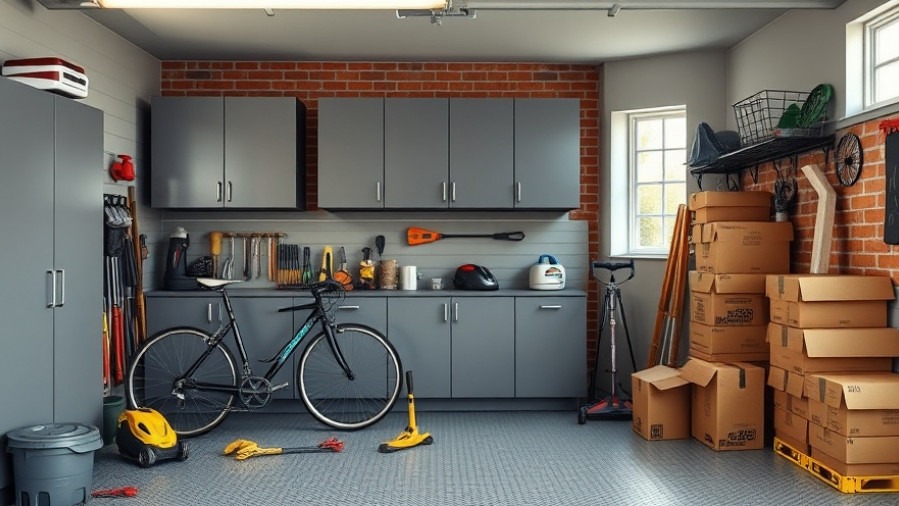
The Hidden Costs of Garage Clutter
Did you know that a staggering three out of four garages in the U.S. are too cluttered to park a car? This statistic reveals just how many of us are guilty of hoarding various items that we seldom use, leading to not only wasted space but potential emotional stress. For boutique hospitality professionals—those small-scale hotel owners and eco-lodge operators who pride themselves on offering guests an eco-friendly experience—managing your own clutter can serve as an inspiring model for your hospitality business. With more room at home, you’ll find it easier to focus on sustainable home design and energy efficiency.
What Can You Reuse or Recycle?
Before you turn to the trash bin, consider that many items cluttering your garage can be reused or recycled. By consciously opting for eco-friendly methods to handle your unwanted items, you're contributing to a zero-waste practice that resonates with the eco-conscious audience of your hospitality ventures. Here are a few categories to consider:
Pesticides and Herbicides: These household hazardous wastes require careful disposal. Rather than dumping them down the drain (which can be disastrous for our ecosystems), check with local hazardous waste disposal centers. This careful stewardship of hazardous materials reflects the principles of a toxin-free home.
Power Tools: If your power tools are still operational, consider selling or donating them to fellow eco-entrepreneurs or local organizations. If tools are beyond repair, look into recycling programs that manufacturers might offer. This behavior fosters not just sustainability but community support, amplifying eco-friendly practices.
Motor Oil and Automotive Fluids: Used motor oil is typically easy to recycle at auto shops, and automotive fluids like antifreeze should be handled professionally due to their hazardous nature. With proper recycling measures, you can help in water conservation by preventing these toxins from contaminating local water systems.
Other Automotive Parts: Many shops accept old car batteries and tires for recycling. Instead of seeing these items as waste, consider their potential for reuse in other forms, perhaps even shaping an innovative guest experience for your customers.
Waste Management: Making Conscious Choices
As your hospitality venture grows, the principles of effective waste management will resonate throughout your business. Just as garage waste deserves a considered approach, so does the management of waste generated by your enterprise. Adopting practices like composting and opting for natural landscaping can significantly reduce your environmental footprint, aligning your business with increasingly eco-conscious consumer preferences.
The Impacts of Inaction
Neglecting garage waste can lead to hazardous conditions, which in turn poses risks for community health and environmental integrity. A report revealed that even seemingly innocuous fluids like brake or coolant fluids can turn harmful quickly. Taking responsibility by identifying and segregating hazardous items in your garage is symbolic of the larger responsibilities you hold as a hospitality operator. How you manage your waste speaks volumes to your guests about your commitment to sustainability.
Practical Steps Toward Waste Reduction
Consider starting a waste management plan that threads through all layers of your hospitality enterprise. This could involve:
Creating a baseline for waste generation.
Setting measurable goals for recycling and waste reduction.
Collaborating with local recycling facilities to find the best solutions for every type of waste you encounter.
Choosing genuine quality parts for repairs not only ensures durability but also aligns with your eco-friendly philosophy. Remember, every small change contributes significantly to water conservation, energy efficiency, and a better guest experience.
Conclusion: Transform Your Space, Transform Your Impact
Freeing your garage of clutter isn’t just about reclaiming space; it embodies the values of sustainability and responsibility that resonate deeply with your clientele. As you reclaim your space, remember that the practices you adopt at home can extend into your business, helping to foster a broader community of sustainability. Consider joining forces with local eco-groups or hosting community recycling events. This transformation can create potential leadership opportunities in sustainability within your hospitality sector. Ready to make an impact? Start with the space you have at home!
 Add Row
Add Row  Add
Add 




Write A Comment